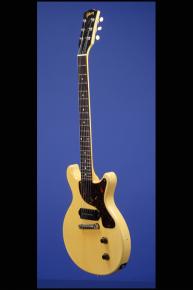A Very Pretty "Beastie"
This super light guitar weighs just 6.90 lbs. and has a nice, fat nut width of 1 11/16 inches and a standard Gibson scale length of 24 3/4 inches. This is one of the early versions, with a solid mahogany "slab" body with slightly rounded edges, one-piece mahogany neck with that great '59 "baseball bat" style profile, and Brazilian rosewood fretboard with 22 frets and inlaid pearl dot position markers. Headstock with "Gibson" logo and "Les Paul TV Model" silk-screened in gold. Black plastic bell-shaped truss-rod cover. Closed-back single-line Kluson Deluxe strip tuners with white plastic oval buttons. Serial number ("0932489") inked-on in black on the back of the headstock. One super hot black P-90 pickup with a huge output of 8.37k. Single-ply tortoiseshell pickguard with four screws. Two controls (one volume, one tone) on the lower treble bout. Black plastic bell-shaped "Bell" knobs. The potentiometers are stamped "134 924" (Centralab June 1959) and the capacitor is the requisite 'Bumble-Bee' type. Combination "wrap-over" bar bridge/stud tailpiece. There is a minuscule amount of belt buckle wear on the back of the guitar and a few very small and insignificant surface marks on the top and edges of the body. Otherwise this is quite simply the finest example of a '59 TV Junior (with a neck to die for) that we have ever seen and therefore our rating of near mint (9.25) condition is fairly conservative. The sound of this little beastie is also quite simply "the bestest"! Housed in the original Gibson brown 'Aligator' softshell case with brown felt lining (9.25).
"The Les Paul TV underwent a major body redesign in mid-1958 and, like the Junior, took on a double cutaway shape with rounded horns permitting complete access to the higher registers. The overall dimensions remained the same but the neck-to-body junction was relocated at the 22nd fret. Simultaneously, a new TV shading akin to banana yellow and a shell-like pickguard were introduced. All the other specifications remained the same… In late 1959 the model was officially renamed SG TV without any changes in the specifications but for the removal of Les Paul markings on the headstock. The Les Paul affiliation was nonetheless ambiguously maintained in catalogs. Owing to its thick body style, the third variant should probably be referred to as the Les Paul/SG TV to mark the difference with the thin-body variant introduced subsequently" (A.R. Duchossoir, Gibson Electrics. The Classic Years, p. 214).
"In 1955, Gibson launched the Les Paul TV, essentially a Junior but with a finish that the company referred to variously as 'natural', 'limed oak' and (more often) 'limed mahogany'. Surviving original TV models from the 1950s reveal a number of different colours, with earlier examples tending to a rather turgid beige, while later ones are often distinctly yellow. Today there is much debate about where the model's TV name came from...One such theory says that the TV name was used because the pale colour of the finish was designed to stand out on the era's black-and-white TV screens. This seems unlikely, not least because pro players appearing on television would naturally opt for a high-end model...Others say the guitar followed the look of fashionable contemporary furniture, where the expression 'limed' was used for a particular look. Certainly Gibson promoted the Les Paul TV as being 'the latest in modern appearance'. There's also been a suggestion that 'TV' might be a less than oblique reference to the competing blond-coloured Telecaster made by Fender. But in fact the name was coined to cash in on Les Paul's regular appearances at the time on television on The Les Paul & Mary Ford Show. This was effectively a sponsored daily ad for a toothpaste company, for which the couple signed a $2million three-year contract in 1953. Gibson reasoned that if you'd seen the man on TV, well, now you could buy his TV guitar. Following a reader's enquiry to Guitar Player in the 1970s, a Gibson spokesman confirmed that 'the Les Paul TV model was so named after Les Paul's personal Listerine show was televised in the 1950s'" (Tony Bacon, 50 Years of the Gibson Les Paul, p. 28).
The Gibson shipping records show that only 543 Les Paul TV Juniors were shipped in 1959.
Translate:











